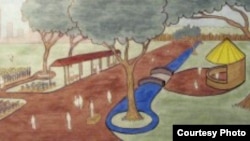A team of college students called Team Giving Tree has won an international award for their work on solving the food crisis. The Texas A&M University students submitted an idea that has become a growing trend, the eco-park. Team Giving Tree’s version of an eco-park centers around an open recreation area that demonstrates sustainable farming and composting methods. The park includes a farmer’s market, food demonstration area, and a speaker’s corner. Beau Barnette, a landscape architecture major at Texas A&M, heads up the team.
“The eco-park system is a physical location. It’s meant to be scalable and suited to anyplace. So it could be a large, heavily populated urban location, or it could be a more rural area. The information and activities available at the eco-park would probably be geared very specifically to that area. So in a heavily populated place like Houston, Texas, it might be geared toward production of food waste, efficiency of food use, and how to avoid over-consumption - you know, general nutrition. But in Africa, it would be geared more toward efficiency in food production still, but also very likely there would be an emphasis on cellular organization of agriculture and customers,” explained Barnette.
Barnette said eco-parks are a great venue for the free exchange of information.
“Even those that are generally educated on agriculture and ecology, and things like that, do not have an intimate, regular interaction with it. With the eco-park, we allow people to go to a standard location, where they know this is, where they can find the newest information, and find the people that are either trying to educate, or activate, be some sort of activist and move things forward,” said Barnette.
Key players in the fight against global hunger are not just aid agencies, governments, and organizations. The younger generation, or next generation, as it is also called, is now taking a big role in actively trying to reduce hunger worldwide.
“This generation is at a pretty great advantage when it comes to being able to look up information, and more importantly, exchange it and be able to review it with one another. Our role is to be very critical of everything that we can read and learn about our assumptions in the past of how things work. I think we need to be very critical of how things are currently organized. That does not necessarily mean cynical. But we should look at the way that food is currently produced, where it’s produced, how it’s transported, and why, and maybe reconsider how we organize ourselves around food,” said Barnette.
Barnette added people in general, when looking closely at food security, want to be close to agriculture because it fulfills a specific need.
“The eco-park system is a physical location. It’s meant to be scalable and suited to anyplace. So it could be a large, heavily populated urban location, or it could be a more rural area. The information and activities available at the eco-park would probably be geared very specifically to that area. So in a heavily populated place like Houston, Texas, it might be geared toward production of food waste, efficiency of food use, and how to avoid over-consumption - you know, general nutrition. But in Africa, it would be geared more toward efficiency in food production still, but also very likely there would be an emphasis on cellular organization of agriculture and customers,” explained Barnette.
Barnette said eco-parks are a great venue for the free exchange of information.
“Even those that are generally educated on agriculture and ecology, and things like that, do not have an intimate, regular interaction with it. With the eco-park, we allow people to go to a standard location, where they know this is, where they can find the newest information, and find the people that are either trying to educate, or activate, be some sort of activist and move things forward,” said Barnette.
Key players in the fight against global hunger are not just aid agencies, governments, and organizations. The younger generation, or next generation, as it is also called, is now taking a big role in actively trying to reduce hunger worldwide.
“This generation is at a pretty great advantage when it comes to being able to look up information, and more importantly, exchange it and be able to review it with one another. Our role is to be very critical of everything that we can read and learn about our assumptions in the past of how things work. I think we need to be very critical of how things are currently organized. That does not necessarily mean cynical. But we should look at the way that food is currently produced, where it’s produced, how it’s transported, and why, and maybe reconsider how we organize ourselves around food,” said Barnette.
Barnette added people in general, when looking closely at food security, want to be close to agriculture because it fulfills a specific need.




